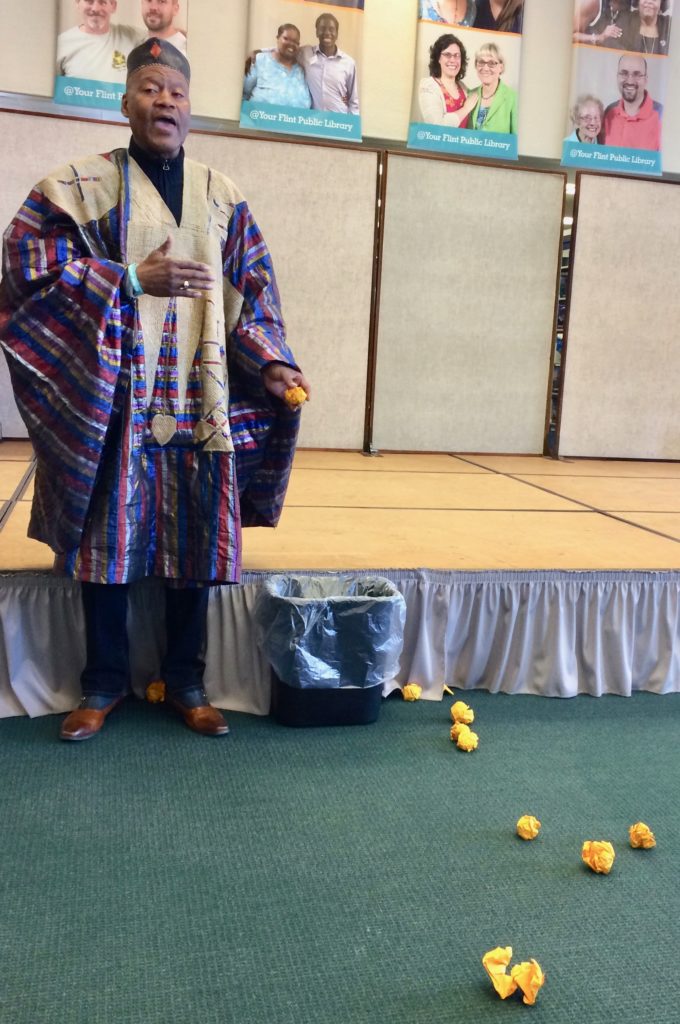By Jan Worth-Nelson
Trying to understand white privilege and power is “kind of like trying to explain water to a fish,” one panelist, a white woman, admitted to a circle of 25 Flint neighbors grappling with the kickoff topic of the 2019 Tendaji Talks Tuesday evening at the Flint Public Library. If you grow up like she did, in a white suburb of Detroit, Judy Alexander said, “You don’t see it because everybody has it, it’s just there — part of the fabric of society.”
But she said she has learned to notice that “Nobody has ever called 9-1-1 because I was sitting in a Starbucks. And when I get stopped by the police, I don’t feel my life is in danger. I assume the police are there to protect me–and they are.
“Nobody cares if I’m barbecuing in a park. Or if my children go to a pool in an apartment complex, nobody’s going to try to put them out because they don’t belong. All of those examples of things that don’t happen to me are the product of me walking around in my white skin,” Alexander said.
The Tendaji Talks, named for the late community activist Tendaji Ganges, who died in 2015, are sponsored by Neighborhoods Without Borders, a grassroots group working to “break down borders of fear and misunderstandings that separate us and divide our community,” according to the series flyer. The theme for this spring’s four-part series is “White Privilege and Power: The Roots of Racism.”

Tendaji Talks presenter Hubert Roberts summarizes results of a “privilege” exercise: those sitting closest have an automatically better chance to get their wadded-up paper balls into the basket (Photo by Jan Worth-Nelson)
Moderator Hubert Roberts, a youth mentor and community activist, guided the group — about half black and half white — through a series of exercises designed to suggest how privilege works and to highlight advantages that automatically accrue to white people in American society.
In open discussion around a circle that followed, several participants related incidents that helped them understand white power and privilege. The group also considered how class, economics, and debatable conceptions of race come into play.
“What I’m sensing from these comments here is the idea that only whites have privilege,” one white man, a local attorney and writer, asserted. “Ever since I’ve been studying this, I’ve commented that privilege goes to those with money, those with connections, those with majority status.
“I recognize white privilege, of course there is white privilege — I’ve benefitted by it,” he said. “But to understand the whole phenomena of who’s fortunate, who’s unfortunate, who’s oppressed, who are the oppressors, we have to look at the whole picture.”
The panel members agreed that everybody has some privilege — even if it doesn’t seem like it to the individual. There is advantage in not being disabled, for instance, or being a man, or having money. Even age, sometime regarded as a source of prejudice, can also be a source of privilege, one panelist suggested.
Ruminating on the context and history of white privilege, panelists noted the “Founding Fathers” were all white, privileged landowners who wrote the Declaration of Independence originally for themselves and their interests, never intending to include women, Native Americans, or blacks. Even the term “founding” came in for critique.
“How can you ‘found’ something that wasn’t lost? And they ‘found’ something that didn’t belong to them,” Roberts noted. “We live in a country of distorted facts and distorted truth — it’s really important to know the real history. This country called America since its inception only needed black people to work and die…”
“We can’t sanitize every event in history,” one white participant objected. “If we did there wouldn’t be anybody that we would consider heroes — even Lyndon Johnson, a hero of the civil rights movement, was a racist.”
But Roberts and Alexander asserted the effects of history are still very much present.
“Even now, at any time, if a black man acts a certain way, I can shoot him with the full weight of the federal government to support it,” Roberts said.
“History is so informative about how we move forward. We’re trying to reach out to our younger generations — we are working to include people because if you’re not at the table when policies are passed, you are on the menu and you will be ate up and destroyed,” Roberts warned.
“Why is it so uncomfortable for white brothers and sisters to have an honest conversation about their privilege, to accept, or acknowledge their own fragility?” Roberts asked the panel.
One panelist, Neighborhoods Without Borders core group member Barb McGhan, suggested many white people don’t feel they have any privilege and believe that they didn’t have any advantages. And when they realize they do, they often feel guilty or embarrassed. Further, she said, some people feel it’s an accusation.
“The thing to understand is we couldn’t get rid of our white privilege if we wanted to — it’s the fabric of racism in our society. It doesn’t make me a bad person…but we need to be mindful,” McGhan said.
Neighborhoods Without Borders team member Donna Ullrich commented often people feel they will have to give something up, rather than coming to a place where they can say it’s not about losing, but about others gaining equality — being able to say, “these are my neighbors and they deserve to have the same advantages I have.”
Panel leader Bob Brown distinguished between implicit and explicit bias, the former often being invisible to a white person and leading to unintentional offenses and misunderstandings.
“I don’t even understand some of the things that I do — and I have to say my African-American friends are pretty gentle,” Brown said. “But they shouldn’t have to be.”
“We are not here to blame or criticize,” Roberts said. “We’re trying to find the truth….We are all going to die, but we can choose how to live.”
“This is an interaction, a relationship — we were hoping that the bottom line is going to the next level,” Roberts said in summing up.
“You can’t legislate hate out of a person, you can’t legislate bigotry or discrimination out of a person, but by us having our fellowship maybe something we said or our interaction with one another, maybe when you go back to your respective clans you can say you had a really wonderful time among some interesting people — and start some dialogue.”
Ullrich ended the meeting by quoting series namesake Tendaji Ganges, who often said, “Leave a mark, not a stain.”
The next Tendaji Talk will be 6 p.m. Tuesday, April 9, at the Flint Public Library, on the topic “The Consequences of Not Addressing White Privilege and Power.” It will be moderated by longtime educator and activist Jeff Bean.
EVM Editor Jan Worth-Nelson can be reached at janworth1118@gmail.com.


You must be logged in to post a comment.